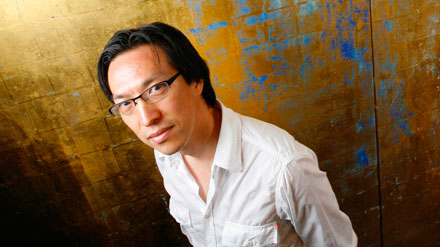 Makoto Fujimura, in many ways, defies being labeled. He is an artist. He is an author. He is a speaker. But none of these completely capture who Fujimura is. Perhaps one way to understand Fujimura is to take a look at a commencement address he made at Biola University:
Makoto Fujimura, in many ways, defies being labeled. He is an artist. He is an author. He is a speaker. But none of these completely capture who Fujimura is. Perhaps one way to understand Fujimura is to take a look at a commencement address he made at Biola University:
To ask “what do you want to make today?” is not an idealist’s escape from reality. To ask “what do you want to make today?” is a quiet resistance against the destructive fears dominating our world; refusing to submit to the inevitability of corruption in our ideologies…
We serve a Creator God, and this Creator created us to also be creative. In the same way that God gave Adam the authority to name the animals in Genesis 2, God invites his children to co-create within God’s parameters. We cannot create ex nihilo, but we are all artists with a small “a,” and we are asked to work through our brokenness and fears. We are created for love; and love is creative. So what would happen if every single person who follows this Creator asked the same question “What do I want to create?” And further, if we became an ambassador to the world to help ask, “What do you want to create, and how can I help you?” What if we answered this question filled with the Creative, Holy Spirit of God every moment that we are awake, and helped others to do the same? Would we have a world more beautiful, compassionate, caring and daring? Would we see our occupations differently? Would we see our universities differently? Would we see our motherhood, our fatherhood, our brotherhood and sisterhood differently?
Makoto Fujimura’s biography defines him as a “cultural shaper” and the Fujimura Institute states that it seeks to inspire people to “collaborate, cooperate and inspire…to piece together a whole view of the world.” He travels through the world of language, music, and art, rooted in ancient Japanese culture but wholly present in today’s achievement-driven society. Fujimura can speak to the business person, the educator, the musician, the theologian. Rather than seeing the world as fragments of jobs, schemes, day-to-day tasks and limited pursuits, Fujimura sees a whole, a whole that is rooted in the belief that God created His world to be ordered:
Culture shaping is not an escapist activity from our current woes: instead it is breathing life into the very ashes from our present and our past, and finding, with T.S. Eliot, “the still point of the turning world.” Generative creativity flows out of not just Eden, but out of this reality of “Life after Life after Death.” We can begin to deposit our efforts into the future, rather than hope to escape into our Edenic past. Our earth, no matter how bleak, is full of promise on this side of Easter. Heaven can invade into our art of life, right in the midst of our ground zeros.
And if the earth acts as a conduit of heaven, then this yeast-like hope can be worked into the dough of culture. Naturally, as I pondered [N.T.] Wright’s comments, I began to ask what if art is infused with heaven, what would that art look like? If true understanding of heaven is not mere escapism, but the physical manifestation of the “substance of things hoped for,” (Hebrews 11:1) then art needs to echo this promise into tangible reality. If Wright is correct, then even ephemeral expressions done in faith will remain etched in eternal reality, and somehow earth, all of earth, is fair game for heaven’s invasion. And every act, done in faith, will count.
Acton University is pleased to present Makoto Fujimura as Wednesday’s Plenary speaker, and the lunch-and-learn speaker on Thursday. Acton University takes place in Grand Rapids, MI, June 17-20, 2014; registration information can be found here.

